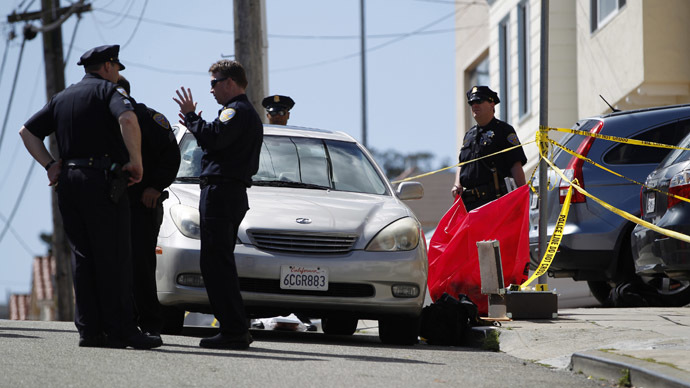California lawmakers took a step forward in protecting citizens who record or photograph the actions of police ‒ but do not obstruct their duties ‒ from reprisals by law enforcement, passing legislation out of committee.
The Senate Public Safety Committee unanimously approved State Bill 411 on Tuesday. The legislation would clarify two current laws ‒ Penal Codes 69 and 148, obstruction charges that are frequently used against citizens recording cops ‒ by adding language to those laws specifying that recording cops is not a violation of them.
“Our Constitution guarantees us all the fundamental right to freedom of speech,” Democratic state Senator Ricardo Lara said in a statement. “Recent events throughout the country and here in California have raised questions about when an individual can – and can’t – record. SB 411 will help erase ambiguity, enhance transparency and ensure that freedom of speech is protected for both civilians and police officers.”
It would also make clear that recording cops does not constitute reasonable suspicion to detain a person or probable cause to arrest the recorder. The bill also protects police by ensuring that these provisions do not allow a civilian to obstruct an officer.

"This bill will prove useful for law enforcement officers–there have been many instances where recordings have helped clear police officers of alleged wrongdoing," said Lara, who introduced SB 411.
The California Newspaper Publishers Association voiced support for Lara's legislation.
"This is a balanced bill and it recognizes the ability of law enforcement to continue to arrest someone if they actually engage in conduct that restricts or causes a problem with an officer's ability to carry out their duty," said Jim Ewert, CPNA's legislative advocate.
"It certainly clarifies so much about what's been going on across the country and even here with the Occupy protesters where reporters were being swept up along with protesters," he said.
Another bill ‒ State Bill 178, also called the California Electronic Communications Privacy Act ‒ would require law enforcement to get a warrant before accessing electronic devices. The bill was introduced after California lost a Supreme Court case regarding the issue.
In its 2014 Riley v. California decision, the Supreme Court unanimously ruled that police must obtain a warrant before searching the contents of a cell phone seized from someone who has been arrested, absent a true emergency situation.
SB 178 has gained the support of tech companies such as Facebook, Google and Dropbox, as well as advocacy groups like the Electronic Frontier Foundation, CPNA and the Center for Democracy & Technology. It passed out of the Senate Public Safety Committee at the end of March, but was referred to the Appropriations Committee at that time.
The American Civil Liberties Union notes that police may not delete photographs or videos under any circumstances, citing the case of James Kinsella, a former Omaha, Nebraska officer who faced felony charges of evidence tampering, as well as obstruction and theft charges for taking two photographers’ memory cards during an arrest. He pleaded no contest to two counts of obstructing government operations, and was found guilty of misdemeanor charges.
But First Amendment supporters note that Supreme Court and other judicial decisions haven’t been enough to protect those recording police actions.
“Considering numerous court decisions have already ruled that recording cops in public is protected by the First Amendment, there shouldn’t be a need for new laws,” advocacy site Photography Is Not a Crime (PINAC) wrote. “But considering cops have willfully ignored these rulings indicates we probably need a federal law to go along with all the state laws just to remind them that they are not above the law.”
The Senate Public Safety Committee also unanimously supported two other bills Tuesday that would require law enforcement officers to undergo 20 hours of instructor-led training to improve their ability to recognize mental illnesses and intellectual disabilities.

